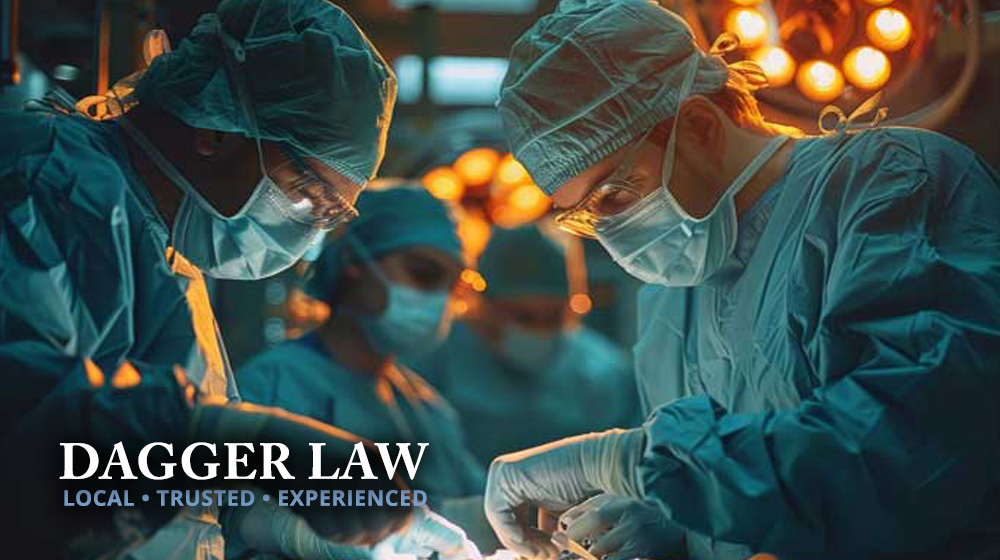
Medical Malpractice
Medical malpractice attorneys assist those people who have been injured by a medical professional, or institution, during the course of medical treatment.
These injuries, whether caused by a doctor, nurse, health care professional, or hospital; must represent a breach, or violation, in the standard of health care in order for it to rise to the level of Medical Malpractice.
Frequently asked questions about medical malpractice claims.
Q: What is the standard of health care? How do I know what it is?
A: Standard of health care can be defined as the generally accepted practices or procedures that the doctor, nurse, health care professional or hospital would administer a patient with a particular ailment. For instance, if you have a headache and a doctor were to give you ibuprofen that resulted in you getting sick; it is probably not medical malpractice since ibuprofen is a generally accepted course of medical treatment for a headache. If you were to go in for surgery on your right knee, and the doctor performs the surgery on your left knee, then that would likely be medical malpractice as an injury was incurred that wasn’t part of a normal course of medical treatment. We can all agree that operating on the wrong body part is never part of a generally accepted plan to get an injured patient well. These are examples of medical treatment errors that clearly fall outside of the standard of care we should expect from our health care system.
Unfortunately, not every victim of medical malpractice has such an obvious case. What happens if a doctor prescribes ibuprofen to someone who has indicated they are allergic to that medicine? What happens if a doctor prescribes medicine for a headache and fails to diagnose a brain tumor? These cases can get tricky, and that is why you need an experienced attorney to help determine whether you have a medical malpractice lawsuit.
Q: Won’t a lawsuit be long and drawn out?
A: Many times these cases can be resolved without having to actually file a lawsuit. Our lawyers use their extensive experience, both as litigators in court and as experienced negotiators when dealing with insurance companies, to obtain the best result for you. Whether you reside in Columbus, Lancaster, or elsewhere in Central Ohio, we can help you pursue compensation for the damages done to you!
Q: What are the most common medical malpractice claims?
A: The most common medical malpractice claim types are:
- Surgical errors which result in infections, organ or nerve damage, unnecessary surgeries, anesthesia errors, surgical implements left behind, and other serious complications
- Diagnostic errors involve misdiagnosis of conditions, delayed diagnosis when early intervention is critical to a positive outcome, or a complete failure to diagnose
- Medication errors such as negligence in prescribing or administering medications
- Lack of informed consent when a doctor, nurse, or other healthcare provider does not adequately inform a patient regarding the risks associated with a suggested treatment, or alternatives.
- Birth Injuries involve a wide array of issues from C-section errors to trauma caused to the baby or mother before, during, or after the birth through the use of forceps, oxygen deprivation, and labor-inducing medications. These malpractice and negligence claims can have lifelong consequences for the child, and in extreme cases can even result in death.
Q: If I believe I have a personal injury case, how long do I have before I need to contact a medical malpractice lawyer in Ohio?
A: At Dagger Law firm, we believe it is best to seek legal advice from an experienced attorney early on in any case involving a personal injury. Primarily, this is because facts and circumstances are fresh in your memory, and it is easier to reconstruct the situation which leads to the malpractice case. It may be too early to determine whether malpractice is a factor, particularly in the case of long healing processes after a surgery or other illness, but you should start gathering information, such as copies of medical records, as soon as you suspect something isn’t going well. The question of “is this the way it should have been” might take a while to form in your brain. If that is the case, you typically have up to four years, from the date of the action that injured you, to file a lawsuit. This is referred to as the statute of limitations. Obviously, trying to remember details four years after an injury will be difficult, and this is why it never hurts to at least write down your observations and questions as they come up.
Q: How much will it cost me to pursue a Medical Malpractice Claim?
A: The last thing you need is a mounting attorney bill when you are potentially out of work and looking at significant medical bills. Dagger Law handles personal injury cases, such as Medical Malpractice, on a contingent-fee basis. This means that our firm collects a percentage of the overall settlement from an insurance company, or award from a medical malpractice lawsuit, as compensation for our experienced legal counsel. Whether your case takes one month or 18 months, our fee is always a percentage of the award. Before retaining services from a medical malpractice attorney from Dagger Law, you will have a meeting with your attorney to review and discuss a fee agreement. This ensures that you understand how and when you will receive your settlements, and how attorney fees will be paid.
The good news is that since our fees are based on the recovery of monetary damages, it is like getting a free consultation as an attorney will typically review medical records and other health care notes in the process of evaluating your case. This may not always result in your case being pursued by our law office, but at least the review will result in some legal opinion on the merits of your case, even if that indicates that you should stop pursuing the matter. We know that nobody wants to be told their case has no merit, but at least it is a valuable step towards moving on.
Q: If I decide to pursue a medical malpractice case, how much can I expect to get?
A: In the State of Ohio, there are damage caps set in Medical Malpractice cases. There are also three kinds of compensation that can be awarded for a medical malpractice case, and it is important that you understand the difference between the award types, as well as how much you can expect to receive.
- The first award type is called Compensatory Damages. This is the compensation for any actual costs incurred as the result of the injury. These include medical bills and lost wages, and there is no cap on this award. Think of this as getting paid back for whatever you have paid due to the injury.
- The second award type is Non-economic Damages. This would be what most people think of as a “pain and suffering” award. In Ohio, the non-economic damages award has a cap. This gets tricky to describe, but for most cases, the award will be no more than three times the compensatory damages (those items you already paid for) or $250,000. That limit does change based on the severity of the case and could be as high as up to three times compensatory damages or a cap of $500,000. Upon reviewing the details of your particular case, an experienced medical malpractice lawyer will have a better idea what part of the range you might fall into.
- The final award type is Punitive Damages. As the name implies, this is for any financial reward that is intended to punish the medical professional, or institution, for any reckless behavior, fraud, or malice. These damages are capped at two times compensatory damages, in most cases.
These damages might not always be pursued, or warranted, and it is important to consult with your medical malpractice attorney for legal advice and to understand what damages you might be entitled to based on the particular facts of your case.
Q: Will a medical malpractice attorney travel to me, or do I need to come to your offices in either Lancaster or Canal Winchester?
A: While some meetings will need to occur in our offices, we try to minimize your travel time. We offer two convenient office locations in Lancaster and Canal Winchester, Ohio. Our goal is to reduce the disruption to your life caused by legal issues and conduct most communications or meetings through emails or phone calls. In certain circumstances, we realize that clients can’t reach us, and we may be required to visit your location. Suppose you retain a Dagger Law attorney to represent you. In that case, they will travel to the necessary court hearings and legal procedures to represent you anywhere in Ohio! Please note that in some instances, the cost to represent your case may require an unusual amount of money due to travel expenses. In such cases, we may recommend using legal representation closer to the location of your case. We are happy to provide referrals in these instances if we are able.
We proudly serve the following communities throughout Central and Southeastern Ohio:
- Fairfield County
- Franklin County
- Hocking County
- Licking County
- Pickaway County
- Baltimore, Ohio
- Buckeye Lake, Ohio
- Canal Winchester, Ohio
- Circleville, Ohio
- Greater Columbus Ohio Area
- Lancaster, Ohio
- Logan, Ohio
- Newark, Ohio
- Other locations nearby
Check out the nearest location to you by visiting our locations page.
Don’t see your particular issue listed above?
If you don’t see what you are looking for here that’s not a problem! We enjoy a challenge and are happy to assist you with any legal issue that you are facing. Use the convenient form on our contact page to ask a question or to schedule an appointment with one of our attorneys.
